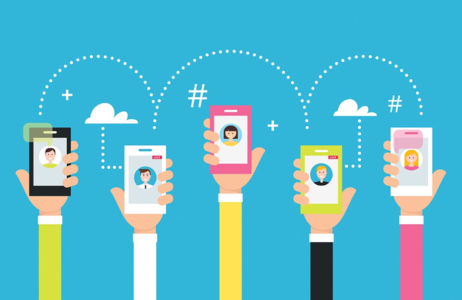With 500 million users across the globe, TikTok is sweeping the social media landscape. A seemingly harmless app which allows users to post short 15-60 second videos, the world of Tiktok is a new “refreshing outlier in the social media universe”. Videos range from lip-syncing, to dancing and art tutorials. Users are encouraged to engage with each other through comment sections, “response” videos and “duets”- duplicating other’s videos and adding themselves alongside. The ease of TikTok is unmatched, and is one of the reasons it has become wildly popular in a matter of months. Yet, this allows for a detrimental and psychologically distressing problem that has taken over the app - cyberbullying.
According to ‘AppTrace’, TikTok jumped from a whopping 269th to 4th in global app download rank in Feburary 2019, with 19.5 million downloads in Pakistan. This has contributed to a world wind of hate, ‘cancel culture’ and ridicule. Many users in Pakistan, especially women, face this cycle of backlash- whether it be for dancing, singing, or body-shaming. Many feel that our society, fueled by religion and social norms, has a hyper-tendency to focus on women’s bodies, masculinity and stereotypes. This spreads insecurity on the platform.
We interviewed several young Pakistani users on TikTok, and asked them a series of questions regarding cyberbullying and body shaming.

Mehak Ali (@mehakk.ali), is a user with 130.7k followers on the app, and 3.6million likes. She began in 2018, and slowly built up a following on the platform with her dance videos.

Eman Daniyal (@emandaniyal1), at age 13, has 53.9k followers, and 924.2k likes on TikTok. She began using the platform in 2017 and uploads dance and lip-syncing videos.

Maryam Akhai (@maryam_akhai) began using TikTok in Grade 10. She quickly gained popularity in a few months and now has 33k followers, and 787.6K likes. Her content mostly consists of relatable, comedic videos and dance trends.

Shan-e-Ali (@iishanealii), a student who recently graduated high school, began TikTok this March. He has gained 12.6k followers and 353k likes in this short period and posts DIY, art, tye dye and fun transition videos.

Aman Daniyal (@amannnd) began her account on December 2019, and currently holds 50.3k followers and 945.4k likes. She is known on the app for her take on TikTok dance trends.
Do you receive hate comments? If so, what do they typically regard? What are some disturbing comments you’ve received?
Each user faced different types of backlash and abusive comments specific to their page. “If I express myself differently than what’s expected of me and my gender, I’m threatening a cycle of toxic masculinity and misogyny”, said Shan. As a male on TikTok, he is expected to follow a specific stereotype.
“The comments mostly have to do with me showing off my body. When I gained weight, my followers latched onto it- just looking through my comment section fuelled my insecurity. Older men would comment on my videos, telling me how to dress, what to do and what not to do.” “People body shame me because I’m thin and call me a ‘stick’… they tell me I’m not Muslim by the way I dress and dance”. Both Aman (former) and Eman (latter) have received comments on the most common form of cyberbullying- body shaming.
With a conditioned response for users to compare and judge others based on appearance, this problem is widely recognized on social media and TikTok.
Maryam stated that the hate comments usually discuss how she’s “too American or white-washed”. “I get a few comments about how I’m disrespecting my culture and religion by my content.” A disturbing comment Maryam received was “only legends can see it”- a statement used by older men when a small part of a woman’s clothing is revealing. “I was even told to wear a dupatta by multiple people which made me feel extremely uncomfortable.”
“The comments I usually receive are a collection of body shaming and hating on my performances of contemporary, jazz and freestyle dance”, Mehak stated. The criticism and judgment on one of her freestyle dance videos was “so intense” and discouraged her so heavily that she “quit dancing for almost a year and a half”. “It made such a negative impact on my life”, she wrote. “I’m dancing again... But it’s difficult to adjust to the hate”.
Do you feel like TikTok encourages cyberbullying/body shaming? E.g the ‘What I Eat in A Day’ Challenge is known for encouraging body negativity.
TikTok has recently been under supervision for encouraging certain body types, removing videos that divert from a specific stereotype. We asked users if they feel as though the app encourages bullying, or whether the people do.
“I feel the app doesn’t encourage bullying- it’s the people who encourage it, and how their mindsets have been warped and developed on the app. Because of millions of users, hate culture is normalised and bullying is much worse. Some tiktokers even cyberbully eachother- encouraging ‘cancel culture’ and sending fans to hate on their competition and those who are threatening their status”, said Shan.
“In my opinion the app itself doesn’t encourage cyberbullying as it provides comments and filters”, Mehak informed Edition. “Sometimes when creators, like me, share their emotions online they usually get negative and sarcastic reactions which can tear a person apart.” Maryam Akhai also agreed that it’s the people that form negativity.
Does our society fuel this negativity? E.g cultures/norms causing these mentalities.
All users that were interviewed agreed that our society plays a hand in this negativity. “There’s a specific mindset and stereotype that others are meant to follow- deviance is not accepted. They don’t think about mental health and find it ‘fun’ to discriminate.” Said Mehak, who has first-hand experienced this hate and discrimination.
Aman stated that “Most people feel like they have the right to judge your skin color, weight and dressing. To tell you how to act, and how to behave when you don’t ask.”
“Because of the norms and cultures in Pakistan, where citizens hate on those who are different or those who follow an alternative lifestyle/views, people spew hate on the app as if they are making change.” Shan’s response showed him agreeing with the prompt.
“People have normalized making fun and bashing others in the comment section.” Maryam also stated,
“I feel like everyone should just let others live their own lives without getting judged. Everyone has their own view on culture and religion and no one’s opinion should change who you are.”
How do you deal, or encourage others to deal with negativity spread on TikTok?
Eman found it helpful to “ignore the negativity”. Maryam recommends others to “ignore all the hateful comments”. “Sometimes I don’t even bother reading the comment section. I would encourage everybody to turn off their comment section so no one can even write negative comments in the first place.”
Shan finds it helpful to “stop posting” and to not “open the app”. “Sometimes I answer the hate, other times I delete the comments. Removing the negativity or replying back helps me”, was Mehak’s advice.
Maryam’s advice would be to “never allow anyone to bring you down.” While Eman encouraged users to find solace in others, as “there are positive people” who help her through the comments. To others, Shan’s guidance is to “appreciate the mark you’ve left and what you’ve done- that should be an incentive to keep you going and ignore the negativity.”

At surface level, TikTok encourages expression through music, but at its core resides a wave of hatred and dislike that knows few bounds. Victims of cyberbullying exist across the platform, and comments may get so intense as to encourage depression, insecurity and mental health issues.
Whether you’re an active user, or a commenter on videos, you should be aware of your impression and ability to affect others. Aim to eradicate negativity and cyberbullying- whether through reporting users or replying to educate others. Social media comes with a responsibility that we must fulfil. It’s up to us to create a safe environment, to craft the world we want to live in.